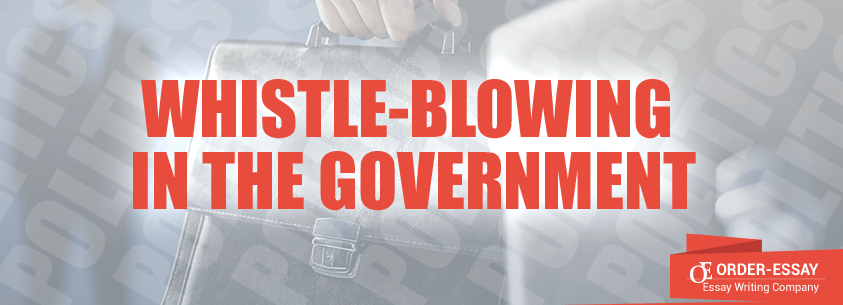
Abstract
Whistle-blowing is one of the emergent ways that enable the public to learn about the various illegal happenings in the government. However, there are diverse views that accompany it. There are those who see it as a source of democracy. Nonetheless, there are individuals who consider it as a negation of the government progress. Some theories are essential in evaluating the concept. Utilitarianism, deontology, and emotivism are crucial in the analysis of the divergent ideas. They bring out distinct contribution to the judgment of morality. The paper discusses whistle-blowing in the government in view of different ethical theories and perspectives. It considers the breach of ethical behavior and virtue among other issues.
Keywords: utilitarianism, deontology, emotivism, morality
Controversies continue to emerge in the analysis of the diverse issues that the nation faces. For instance, whistle-blowing in the government is an idea that fetches dissimilar views from stakeholders in the community. Consequently, application of ethical theories for the ultimate well-being of the society is vital. The Free Dictionary defines whistle-blowing as a situation where a member of the administrative position informs the public concerning the issues of corruption and mismanagement or other illegalities that are evident in the government (“Whistleblowing,” n.d.). In other words, the public is usually not aware of these occurrences. For example, one of the ministers in the government can acquire money from the treasury through unverifiable means. The scandal may remain disclosed to the public unless one of the officials speaks out. Current paper elaborates upon perspectives of three ethical theories on whistle-blowing.
Background
Whistle-blowing continues to raise diverse arguments. First and foremost, there are people who believe that it promotes healthy governance. In other words, it eliminates the acts of illegalities that otherwise occur in the state administration without the knowledge of its citizens. Second, it promotes accountability. People consider whistle-blowing as a measure of ensuring that state employees are accountable to each other. Nevertheless, there are people who think that it is a source of shame to the government. They believe that such issues should not come to the limelight. Consequently, they prefer keeping silent.
Deontological Perspective
According to Copp (2007), deontology judges the morality of an action on the extent to which it sticks to the defined regulations. It means that when an individual does an action that is in concordance with the set rules, it is considered to be right. Moreover, wrong occurrences are also defined by rules that prohibit their happenings (Cline, n.d.). Evidently, it is on the basis of duty. For instance, there are universal moral rules that do not allow killing of an innocent person, stealing, lying, etc. However, the consequence of the action does not matter. In regard to the model, when one blows the whistle in the government on an act of mismanagement, it must be viewed as obedience to the set rules. For example, the morality of his/her action is based on the terms and conditions of his/her work. If his/her work allows him/her to inform the public concerning such an occurrence, then his/her act is justified. Nevertheless, if the terms of his/her job do not give permission for whistle-blowing, then it is considered as a wrong action.
Breach of Ethical Behavior
However, this model raises a concern about the ideology. It is apparent that whistle-blowing is justifiable when one does it as a part of duties. Therefore, it means that it condemns people who perform the action without the supreme mandate. For example, the model breaches the law of ethical behavior. In the daily living, it is acceptable that the administration provides services to its citizens. Moreover, they must account to the citizens every manner of activity that they do. Prohibiting whistle-blowing on the basis of duty has an adverse effect. It is likely that citizens may suffer without knowledge of government occurrences. For example, government officials can mismanage funds without their knowledge. The model is ineffective in promoting good governance. Needless to say, few institutions in the world acknowledge its members to blow the whistle when they sense illegal activities in their dockets. In fact, it is a silent issue that many executives do not tackle openly. Therefore, a society must analyze the perspective before embracing as a form of passing moral judgment.
Utilitarianism
It is one of the most common theories that govern most societies. According to Copp (2007), utilitarianism demarcates the morality of the event on the basis of its benefit to the community. In essence, an action is right if it brings happiness to the greatest number of people in the country. Consequently, even if the action is ethically right but only few people benefit, then utilitarianism does not accept it. Therefore, one must aim at maximizing the pleasure and minimizing the pain. Thus, the intrinsic value of an action is paramount (Copp, 2007). It is powerful and persuasive in nature. When a minister mismanages funds or takes part in a financial scandal, the deed faces judgment in view of the satisfaction that it brings. However, the issue of corruption or mismanagement has two sides. They are those within the government who may opt to hide the action to avoid embarrassment. Moreover, they believe that the entire government can lose its job owing to the unconstructive publicity. On the other hand, the public believes that such corrupt leaders ought to be investigated and brought to the limelight. They emphasize that the pressure from the society helps in the justice process. Therefore, it is acceptable for one to blow the whistle when there is a matter of concern.
Breach of Ethical Behavior
The theory seems persuasive in meeting the needs of the public. However, it can negate wrong doings. In other words, it can be easily misused. There are individuals who can propagate erroneous information in order to undermine the trust of the society. Moreover, at times public satisfaction is not enough. Whistle-blowing is beneficial when it is done with the right motive.
Emotivism
The philosophy affirms that an action is purely an expression of emotions (Cline, n.d.). It refutes factual evidence in the judgment of an act. Consequently, what an individual says is not admissible as facts. The theory recognizes the existence of emotions in the life of a person. In essence, the objectivity of the statement ought to be reviewed. According to the theory, one cannot conclusively say that the action is right or wrong. In view of whistle-blowing, the ideology depicts that it is neither right nor wrong depending on the emotions at display. For instance, if the person who brings the matter to public expresses contempt, then the action is wrong. However, if another individual shows satisfaction, then whistle-blowing is acceptable. Approval or disapproval of whistle-blowing is based on our comprehension.
Breach of Ethical Behavior
The theory has biases. In essence, people have varied emotions at dissimilar points in time. Moreover, there are different external factors that define the thoughts of a person. The theory does not recognize the universal rules of life. It is evident that the theory fails to consider the extent of harm that corruption brings to the society. Basing the judgment on how one feels is a form of bias. Needless to say, it is hard to define the motives behind one’s attitude. Consequently, the model breaches ethical aspect of accountability and transparency in the community. In fact, it shifts the responsibility of state officials to the interpretation of emotions.
Comparison of the Perspectives
While ethical theories are vital in helping the community determine the authenticity of the action, they are divergent in their expression of the views. For instance, utilitarianism is different from the deontological perspective. It lies on the maximum benefit that the community gains as a consequence of the action (LaFollette, 2000). In essence, the community can profit from the theory. However, care must be taken to avoid the breach of events. It is also essential to come up with a procedure that determines the greatest number of people. In such cases, performing opinion polls is vital. It may help to establish the perspective of the country concerning whistle-blowing. Nevertheless, the government must seek to uphold the views of the ordinary people.
On the other hand, deontology occurs on the basis of adherence to the rules. It is evident that the model works best in a community with defined standards and regulations. Moreover, they must have the interest of the citizens. Some state officials can breach the theory by failing to include a clause that puts them responsible for the tasks of the executive. However, the emotivism concept is distinct. It has a lot of errors in making judgment. Unlike the other two, the model uses emotional attitude in defining morality. Consequently, the tendency to dismiss a factual claim is apparent. Emotivism breaches several ethical points. For instance, it fails to consider the views of the general public. It also does not highlight the rules that the community set; therefore, the theory should not be applied independently.
Conclusion
The discussion highlights various models that are applicable in arguing for or against whistle-blowing in the government. Utilitarianism, for example, affirms that the morality of an action requires the greatest number of people to receive satisfaction. Deontology defines its judgment by demanding everybody to fulfill his duty according to the set regulations. On the other hand, emotivism traces its views on the emotional expression of a claim. Consequently, whistle-blowing in the government is subject to endless debate. Nevertheless, the society must critically analyze the theories and determine which one is the best for the citizens.











